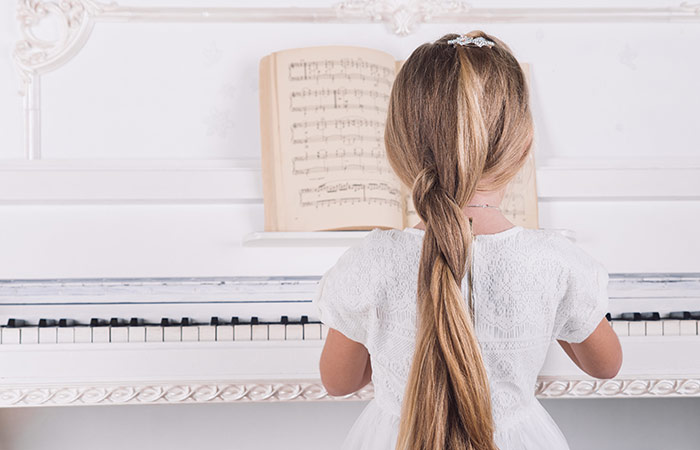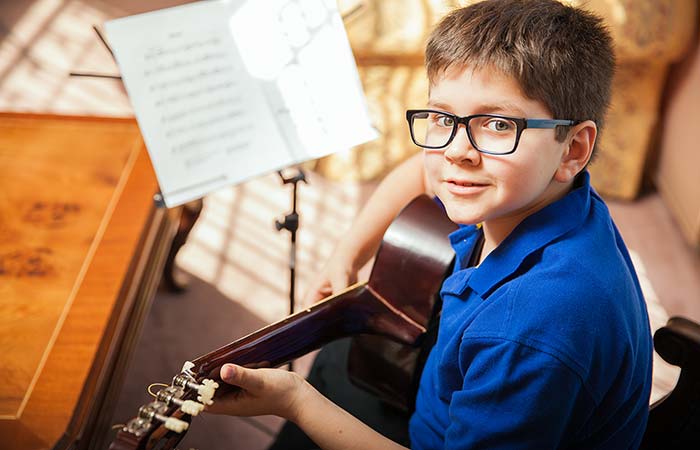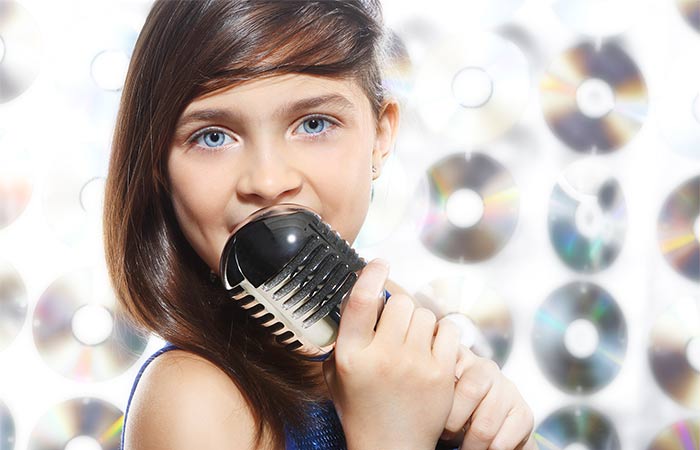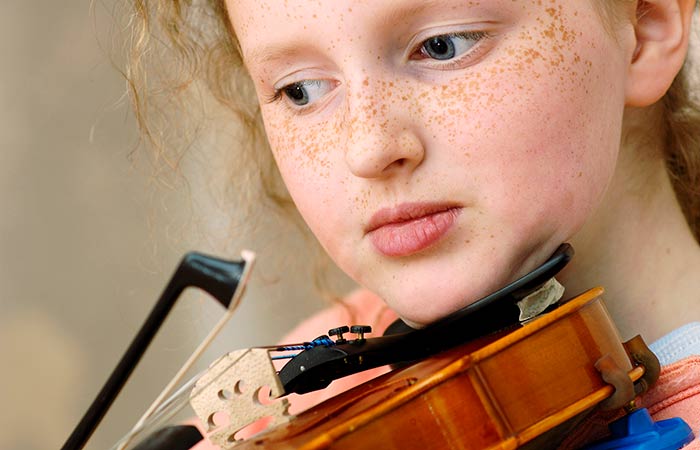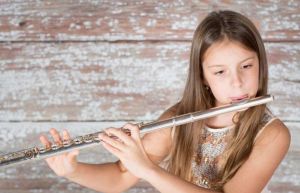“Whether you grew up in a musical family, encouraged to practice endless hours before recitals as I did, or whether you claim the littlest musicality of anyone you know, there are unquestionable benefits to playing musical instruments, especially piano. Furthermore, studies show it is truly never too late to start learning piano – the mental and physical benefits apply to all ages.” Olivia Groves Posted: Feb 21, 2018
“Between soccer and scouts, your school-age kid’s schedule is loaded with fun activities. If you’re on the fence about adding music classes to the list, take note of the benefits that come with signing your little one up for violin or piano lessons. Maybe she won’t be the next Beethoven, but she may have an easier time learning math, practising good manners (including patience!), and becoming a team player. Read on to learn more about the benefits of music education.” By Angela Kwan
Many parents ask the question of whether it’s really worth it to spend money on letting your child do music lessons like piano lessons or violin lessons or singing lessons. Why would it be profitable for your child to do music in the first place seeing that most music tuition is seen as an extramural activity and not as part of the every schooling curriculum besides for the normal music periods in school which would basically include singing some songs etc?
For the parent who themselves learnt to play a musical instrument, who discovered the joy and excitement thereof, the relaxation and the open doors that playing an instrument brings, this parent will have no two thoughts on planning for their children to learn music.
Two important areas of development for future adult life
Personally, I think there are two areas of development in your child’s life that need to be addressed specifically, seeing that both of these areas can be ignored, leaving a gap in later life as an adult.
FIRSTLY the aspect of learning to do a good sport and making exercise part of your daily life.
SECONDLY being able to play a musical instrument by learning it from an early age so that playing an instrument may become as natural as reading a book.
Why would learning to play music or a musical instrument as a child be important to such an extent that you as a parent are willing to pay lots of money not only for an instrument but also for weekly training which will continue for years?
In short, one can make a list of benefits or pros for learning to play an instrument.
Enjoyment of being able to play music for a lifetime
First of all, I think the most important reason to let your child learn to play an instrument or study music is because of the great joy which playing an instrument brings to you as a person. This is especially true as your child grows older and into your adult years in which he or she will still be able to play and enjoy their instrument. Many older people in their later years return to their favourite musical instrument which they started to study as a child, as it gives them something to live for and a purpose or goal. This is especially true in the later years of the elder adult when boredom can set in without having something to better yourself in.
There are great advantages in learning to play music as a child. Children learn to play instruments almost without being aware of it in comparison to the adult. Children are quite unaware of time, months and years passing while adults are normally acutely aware of months, days, hours and years passing. Letting your child learn to play piano or violin, guitar or some instrument is one of the best gifts that any parent can give their child for the rest of their life.
Learning to play an instrumental has a major impact on the development of your child, both mentally, emotionally and spiritually.
A musical instrument can provide many benefits for your child to learn to play. From increasing memory capacity, enhancing coordination, teaching the player discipline, responsibility and self-expression, taking the time to learn a musical instrument can be a worthwhile activity for both children and adults.
Brain development and emotional capabilities boosted
Learning music at an early age helps the child boost their brain development and their emotional capabilities as well as skills in mathematics and reading. Learning to play an instrument is usually a “one on one” student-teacher situation in which your child will receive special attention from a single teacher to a single student. This can be a great lifelong uplifting experience for your child especially if your child and the teacher relates well. This personal attention helps to develop the child in confidence and in being able to express themselves.
The ability to create music
Your child will develop a broader sense of life, having the opportunity to be able to not only “hear” and understand music but especially being able to play music for themselves. Having the ability to create music, read music and interpret it for themselves can not be measured. We all know music plays an important role in society and in the life of every human being. In a sense, we do not always realise the importance of music in every single day of our lives.
The role of music in everyday life
How do we today use music in normal everyday life?
In many homes, the TV or the radio or the CD or the iPod player will be on from the moment people wake up till they go to bed. In some instances, people even use music to soothe themselves to sleep. This means that without us even realizing it, music plays a very important role in everyday life. Being able to play an instrument as a human being gives you that scope of creativity that is so many times lost in today’s world of business, study and work.
Letting your child learn to play an instrument definitely costs a lot financially but if you put the cost of the money versus the development of the child in every area, plus the joy that it brings to your child especially in later life, it is truly worth it to spend that money!
Proper musical training
I want to repeat the importance of getting proper musical training. I have met people that taught themselves to play an instrument but they never had proper musical training from a well-trained teacher for whatever the reason may be. In most of these cases, the person playing the instrument always feels inadequate and unsatisfied in their music. Not having proper training often leaves the player feeling
inferior and ill-equipped, knowing that they do not have the basic background, correct hand position or theory needed. This can, however, be studied in later years but if you as a parent can give your child the opportunity to study the basics of music, the basics of the piano or whichever instrument they choose plus the basics of musical theory on a continual weekly basis, it can only benefit your child greatly. The child slowly learns and gathers information over the years without even realising they are studying. This paid for tuition will only give them a huge heads up in life.
The importance of being able to play an instrument for the teenager
It is a fact that the child who has learnt to play an instrument, in their teenage years, feels more confident and sure of themselves than the child who can not play an instrument. Not only has your child been prepared for teenage troubling waters, knowing and understanding good music, but your child has developed a creative skill to use in times of boredom. The youngster that never learnt this skill often lacks confidence and can easily fall into all sorts of unwanted practices. There is also that honour that comes to the student who can simply flick out the guitar at the campfire and start to play songs. It gives your child an edge above his/her peers.
I remember being in high school where a young guy could play the classical guitar beautifully. Of course, every young lady in school was adoring this young man because of his ability to play. His beautiful playing opened many doors for him into school concerts and onto the stage. Although this is not what life is about, the ability to play an instrument does have great benefit for the teenager growing into adulthood. Being the start of the school is not the main reason to let your child do music but I think the importance of having the ability to play an instrument and the enjoyment of making music especially as you grow older and move on into adulthood, is important. Having an outlet for emotions and creativity through playing an instrument is not something to be missed.
The priceless gift of being able to play an instrument
Having this gift of being able to play an instrument which will be taken into your adult years is priceless. Unfortunately, the parent does not always see the “pricelessness” of the training in their grown-up child’s life or they don’t realize the “pricelessness” of it. Many adults today do not realize how thankful they should be towards their parents for letting them study music in their forming years. As I’m writing this, I actually have to remind myself of having to once again say thank you to my very own parents, to whom learning to play the piano or a musical instrument was not something to be discussed. It was a given. It was the normal thing to do because it was seen as a part of normal life. I do thank my parents for this mindset.
“Fathers, it’s worth it!”
I especially want to exhort fathers. It will be absolutely worth every penny to let your child learn to play an instrument. Maybe you yourself will not see the fruit of it as you would want it to be but your child as a grown-up later most probably will find out the worth of all the hours, all the time, and all the money that you spent in their lives for musical training.
Learning to play an instrument can help your child fine-tune her ear and enhance skills needed for education and social interaction – Angela Kwan
The importance of a good teacher
It’s important to find a good teacher for your child. I think the most important aspect around a teacher is the ability of the teacher to link up with your child and to motivate them by getting them excited about playing their instrument. Not every teacher will ‘click’ with your child so it is important to find the teacher that makes your child want to ‘run’ to their musical instrument and music class. Of course, there might be times when they don’t want to ‘run’ to music class and it’s not always the teachers’ fault. Sometimes it’s the pressure of the work or not being prepared but you as a parent will quickly be able to discern.
Which instrument shall my child play?
It’s important to find a good teacher for your child. I think the most important aspect around a teacher is the ability of the teacher to link up with your child and to motivate them by getting them excited about playing their instrument. Not every teacher will ‘click’ with your child so it is important to find the teacher that makes your child want to ‘run’ to their musical instrument and music class. Of course, there might be times when they don’t want to ‘run’ to music class and it’s not always the teachers’ fault. Sometimes it’s the pressure of the work or not being prepared but you as a parent will quickly be able to discern.
“Ultimately, the instrument you and your child choose should depend on a number of factors. Here’s a list of questions to consider before bringing home a new music maker:
- Is your child excited about the instrument? Does she like the way it sounds and feels?
- Is the instrument too challenging or is it not challenging enough (for both you and your child)?
- Does your child’s temperament match the instrument?
- Can you afford the instrument and the maintenance that comes with it?
- As a parent, do you like the sound enough to listen to your child practice it for hours at home?
- Is your child specifically interested in a particular music style? If so, factor that into your instrument choice, as some specifically cater to certain styles. For instance, a violin player will have a hard time fitting in a jazz ensemble.
Experts don’t always agree on which instruments are best for big kids to learn, but many music teachers do agree that it’s hard to go wrong with the piano, percussion (like the drum or xylophone), recorder, guitar, or violin.” By Angela Kwan
What is the correct age to start with musical training?
I am many times asked about the correct age to start piano training or guitar training. Most music teachers are taught that a child should at least be able to read and write at school before they start formal piano training. Personally, I think there is no specific set age to start to play an instrument. It would be best to let your child start as soon as possible or as soon as you feel it’s the right thing for them. In the beginning, you as a parent could try to do music with your child yourself, but of course, being busy as parents, it’s not always that easy. The best is to find a musical group if your child is young. Today toddlers groups are often available to start with. If the child shows exceptional abilities, it’s time to find a teacher willing to take a child even before they can read or write. Why not start reading music before reading the alphabet?
The fruit of musical training cannot really be estimated
Once again I advise all parents to let your children learn to play an instrument and do music as soon as possible, as the fruit and development coming from it cannot really be estimated. It far exceeds Ice cream and holidays in a sense, as it becomes part of a lifetime ability and pleasure. If you are thinking about starting with piano lessons for your child, it’s the right time to start. Do not delay.
“It teaches them, learning the piano, discipline, dedication, results, possibly a lifelong skill, appreciation of music, and, yes, math. You begin to see a correlation between music and math, and they both begin to make sense. Sometimes it is not the “result” that benefits but the journey to get there.” Hannah


